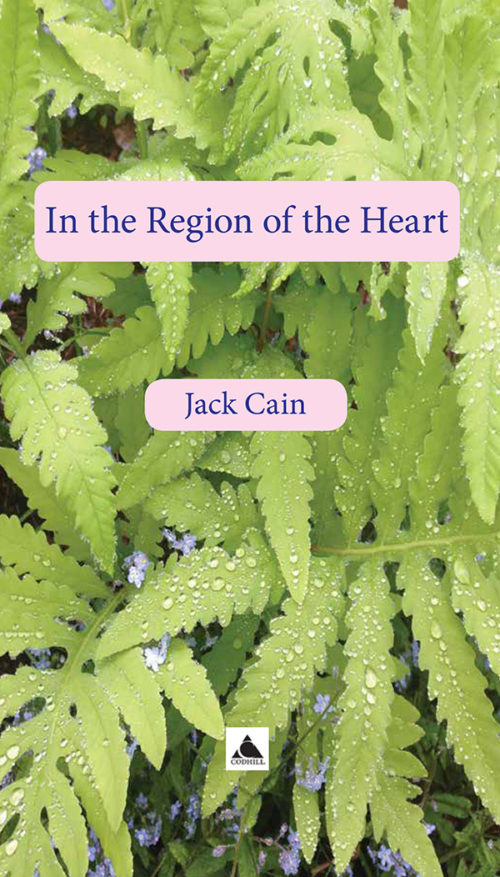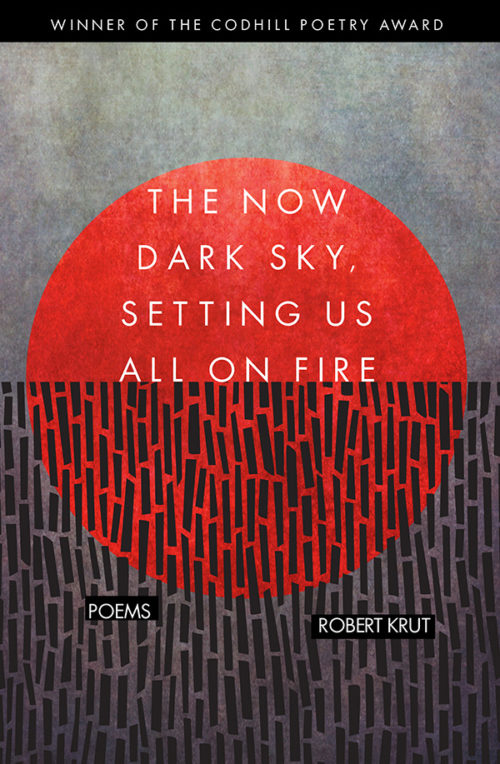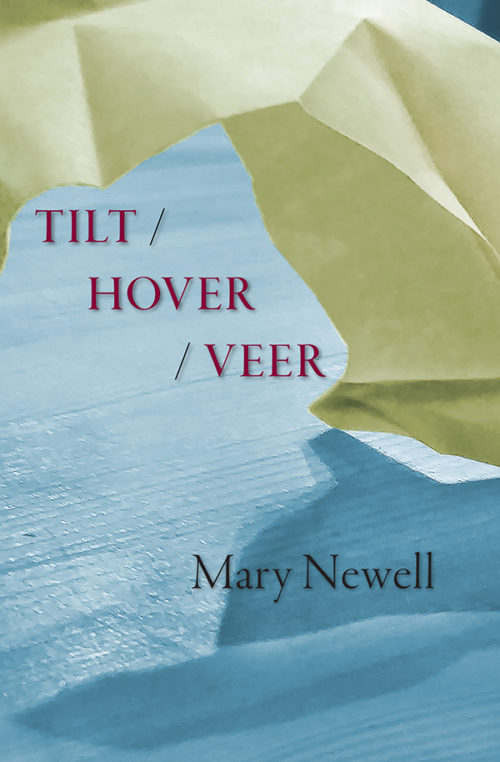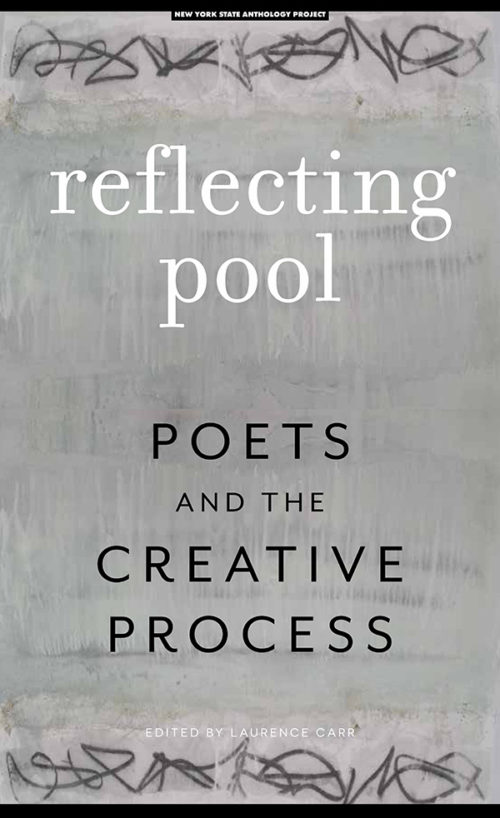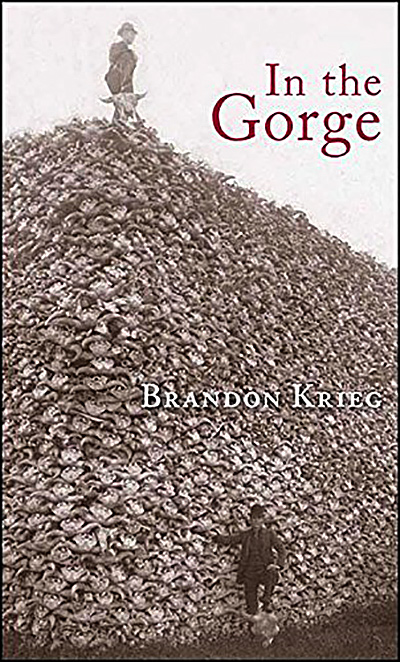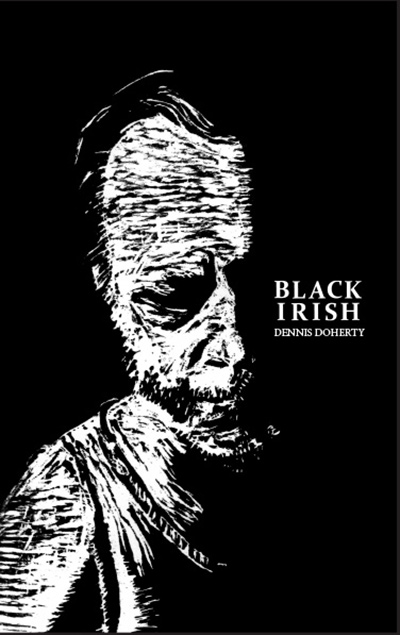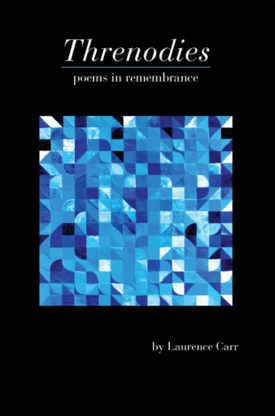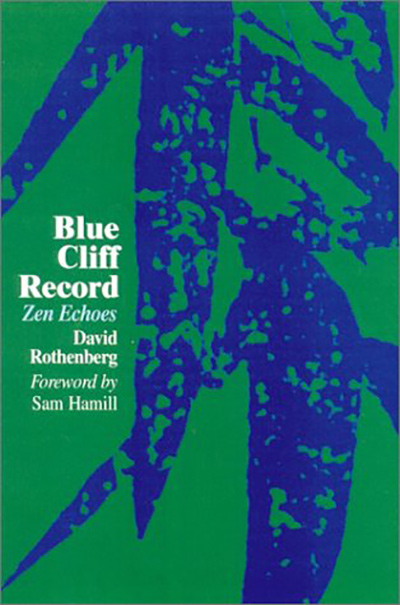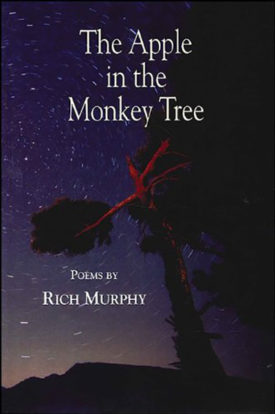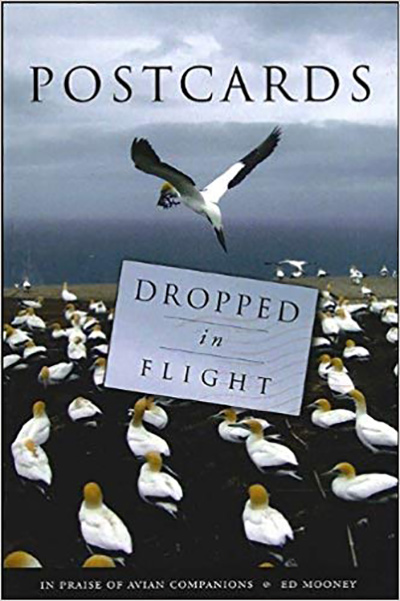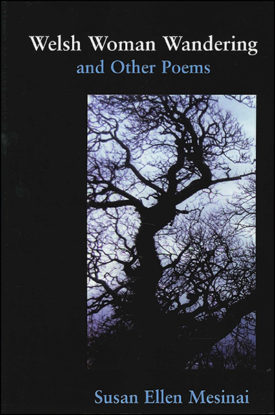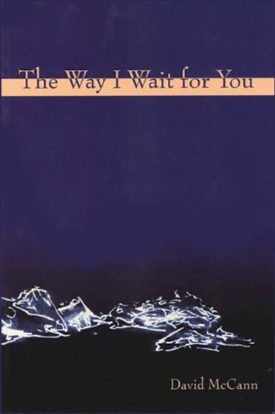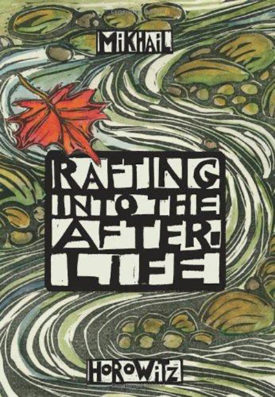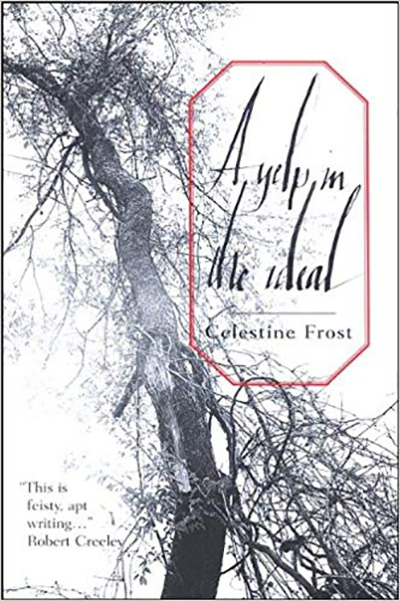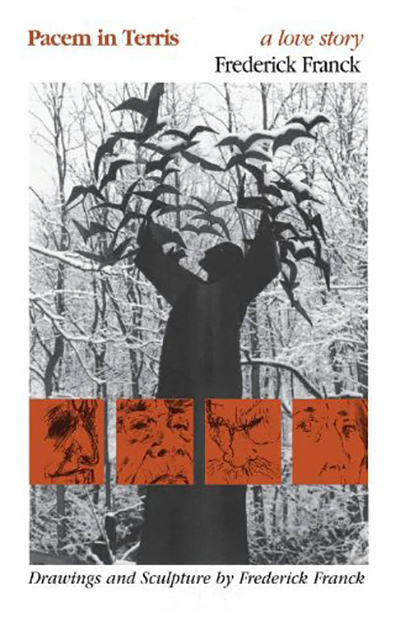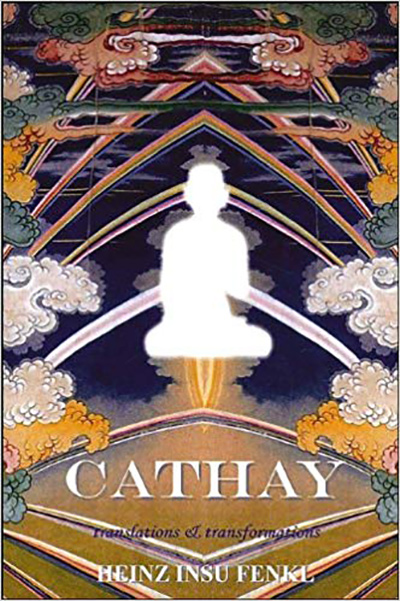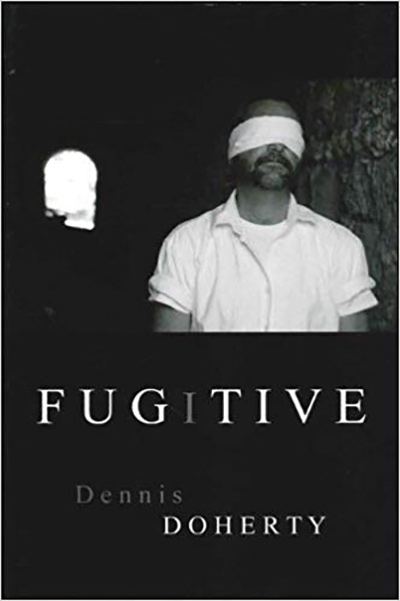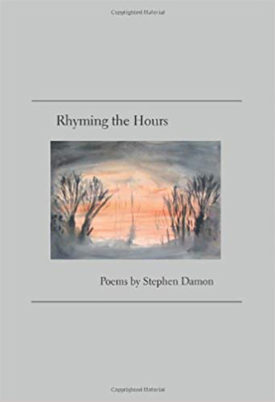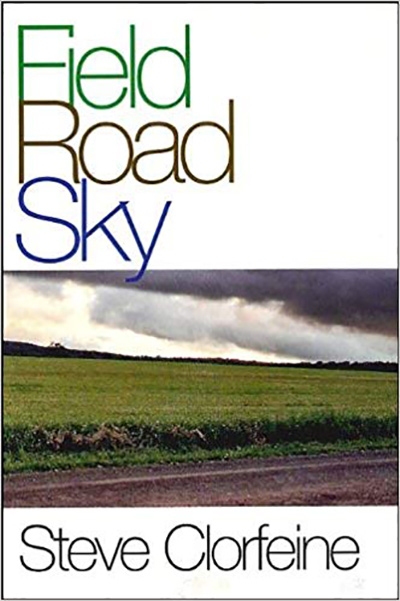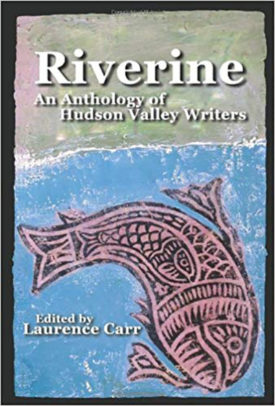-
Most of these “fragments” were written by Jack Cain in group poetry sessions he was facilitating. The sessions were designed to be an exploration of the distinction between material arising from the subconscious mind as opposed to material arising from our ordinary consciousness. This direction came from G.I. Gurdjieff’s startling and impertinent statement that our subconscious is our “real” consciousness and our ordinary waking state of consciousness is “fictitious.” The group writing session would begin in quiet, participants would watch what arose and then write from that. Once everyone was done, the results would be read and there would be an exchange on what had been observed. These exchanges helped those present understand that we are all much more deeply connected than we realize.
-
Codhill Poetry Award Winner 2018
In The Now Dark Sky, Setting Us All on Fire, Robert Krut unveils surrealistic imagery and apocalyptic moments that encroach on his cityscapes. Entering his urban vision of off-kilter fingerprint police, helix fireworks, and lockboxes replete with “unsewn / buttons from the shirts of dead men” (“The Vault”), we are invited to witness how “daylight peels silence / off the sides of buildings” to reveal vampire teeth and arrows (“Phantasmagoria at Six AM”), how “every single body on the street / turns to paper” (“At This Very Moment”). Krut dismantles the world around us and in turn remakes it into something dark yet alive, a place seething with desire, where “A thousand leaves are worth one wish” (“This All Starts With You, and This All Ends With You”)From the very first poem in this quiet and intimate collection, Robert Krut inventively crafts image after shape-shifting image, each suggesting an alternate universe designed to help us better understand our real one. From a preacher in a lentil rainstorm to a doorman wearing a hat full of beetles, we meet people (and see places) filled not only with what is real but with what is possible. Between these magical details runs a clear and steady narrative: a speaker who dons the “too-small sweater of summer.” Who knows that “danger isn’t a bomb, danger is a drip.” And who survives “this pension of suffering.” The graceful poems in The Now Dark Sky, Setting Us All on Fire beautifully balance being both agent and acted upon. Krut is a poet of vivid imagery and distinctive voice.—Patricia Colleen Murphy, Hemming Flame
Robert Krut’s newest collection, The Now Dark Sky, Setting Us All on Fire, paints a landscape of imagination where the Lord of Time might be bargained with as we are left “waiting to be swallowed whole.” The seductive tactility of Krut’s language reminds us of our bodies, our bones and teeth, our veins and fingerprints even as we move among dragons and giant arachnids. A provocative pendulum swinging from fantasy to physicality and back again, these poems acknowledge our longing for escape but leave us with the inescapable conclusion that we are tethered now and forever to ourselves and to this blood-drenched world.—KMA Sullivan, Inclined to Riot
A poem inside a poem is a guest, and Robert Krut’s new compilation The Now Dark Sky, Setting Us All on Fire is worth putting the kettle on to serve. I am in awe at his ability with composing words, where the music from deep imagination comes easily to him. I’ve dined with these poems, went for long walks with “Now, Breathe Fire” and “Dear Demon” inside my coat pocket. I wrote his poem “Welcome” on a lotus leaf and posted it on my front door because it reminded that it is good to welcome the essentiality of darkness from time to time. Let these poems be lanterns to the door you are about to open. This collection is a treasure and good reason why we must keep on breathing.—Sam Roxas-Chua, Saying Your Name Three Times Underwater
2019 | 80 pages
-
It is most apt that the poems in Tilt / Hover / Veer utilize the modular refrain of in the pith of, dovetailing nicely with pith’s dual meanings: spongy plant tissue and the crux of / essence. Newell’s pithy fragments capture the essence of fleeting moments in time, whole worlds of weather, and portals into the wider universe. With a calm convergence of science, nature, and delicate imagery, Mary Newell’s poems speak to us in a distilled yet expansive diction that pulses and chimes with empyrean elegance and a rhythmic beauty. This chapbook glows with fire and light.
—Cindy Hochman, editor-in-chief of First Literary Review-East
Breathe in…tilt hover veer…breathe out…tilt hover veer. At any time in life, let alone these endangered times, tilt hover veer becomes a mantra, a pith, an essential part of our quiet. So “listen forward,” the poet encourages early in these pages, as the world’s great motor churns. For “We enter this world floundering”…
—Mike Jurkovic, poet, pundit, provocateur. President, Calling All Poets Series, New Paltz & Beacon, NY
Rich in surprising, often musical language Mary Newell’s poems bring us into the essence of experiences often overlooked. Tracing small details in the natural world Newell asks us, again and again, to pay attention to what matters.
—Ruth Danon, author most recently of Word has it
The Hinge poetry of Mary Newell arrests and lifts like the centrifugal surge to a sleeping volcano—with blasts of magmatic visage.
—Jonathan Mulcahy, poet
-
Reflecting Pool: Poets and the Creative Process is an innovative volume of poetry and essays by twenty-five New York State poets who teach the writing of poetry, run poetry workshops and publish the poetry of others. The book is both a poetry anthology and an informal textbook with contributing essays by each poet that offers the reader personal insights and opinions about how poetry is created, crafted, and presented. Included are a wide array of prompts and exercises that these mentors use in their classes and workshops to stimulate the creative process in poets of all ages. Also added are basic ideas about how poets can best present their work in public readings. The book can be used as the focus for symposiums on teaching the writing of poetry as well as a textbook for high school and college students, adult and senior writers, and for those who run poetry workshops or reading series. 2018 | 172 pages
-
Codhill Poetry Award Winner 2016
In Brandon Krieg’s stunning collection In the Gorge, we are placed on a tightrope, balancing the leisure of Western society against the survival of the natural world. Here, nature and human lunge and parry, conjoined twins in a struggle to the death. Krieg reminds us that our manufactured beauty is part of the planet-wide tableau—“looking down from an overpass / looking up through the canopy / the contrails the sunset / are not different things.” Part pastoral, part elegy for our future on Earth, In the Gorge urges us to believe in mercy, in redemption, and the dire need for entwining ourselves with the natural world. This is a phenomenal work.—Glenn Shaheen, author of Energy Corridor
Cornfields, jet trails and power lines, fences, abandoned mines and greenhouses—human delineations mar but do not yet overpower the nonhuman landscapes in Brandon Krieg’s stark, unerring and beautiful poems that, over and over, seek “to find the way back // to this day among days.” Krieg’s voice is watchfully tender, attentive to nature and to our moment in it, ever aware that even as we leave our signatures after us, so does fireweed. In this lovely ecopoetry, Krieg achieves a “good fearfulness” and even a joy that is no more or less elemental than rain.—Nancy Eimers, author of Oz
Intelligence at its vastest stretches to a scarcest cry, and is ours, and not: you’ll hear it amply in the haunted, restless, dead-on lively poetry to be found in Brandon Krieg’s In the Gorge, a collection that finds its author deep in it, the sorrow and the joy, and the clarities that in this poetry have a luminosity all their own, because they have been seen, because they have themselves seen through us. I marvel at the heights of technique: free verse rising out of necessity to new necessities, new flashes and new spells. Even more considerable here is the marvel of the voice as it propounds resilient—tested, lived—ways into lyric sympathies and a compassion free of attachment, taking up dwelling there, gazing across.—William Olsen, author of TechnoRage
Brandon Krieg is the author of Invasives, a finalist for the 2015 ASLE Book Award in Environmental Creative Writing, and a chapbook, Source to Mouth. His poems have appeared in The Antioch Review, Crazyhorse, FIELD, The Iowa Review, and West Branch. He is an assistant professor of English at Westminster College in Fulton, Missouri.2017 | 74 pages
-
My mother said I had it, my father’s Black Irish. She loved him powerfully, as she did me. Still, I knew that couldn’t be good, the way she said it, a disease. But what exactly did it mean? – BLACK IRISH Dennis Doherty is author of three other volumes of poetry: The Bad Man (Ye Olde Fontshoppe Press, 2004), Fugitive (Codhill Press, 2007), Crush Test (Codhill Press, 2010), and a meditation on Mark Twain's classic, Why Read The Adventures of Huckleberry Finn? (New Street Communications, llc, 2013). Mr. Doherty’s works appear throughout the literary press. He teaches creative writing and literature at SUNY New Paltz, and lives with his wife, Shari, in Rosendale, New York, hometown to their beautiful three daughters.
2016 | 68 pages
-
Poems of Remembrance A journey through time and place with stops to visit Madame Curie, Charlie Parker, Scheherazade, Madame Bovary, Lee Harvey Oswald’s coffin and God among others.
2016 | 76 pages
-
Zen Echoes
"It is astonishing how thousand-year-old riddles are brought here to evocative poetic life. David Rothenberg converts them into contemporary verbal music, an arcanum, a profound secret, a mystery without intellectual solution." —Frederick Franck, author of The Zen of Seeing, The Buddha Eye, and other books Much as Coleman Barks breathed new life into the work of the great Sufi poet Rumi and reached the hearts and minds of contemporary readers, David Rothenberg now brings us vividly poetic new versions of the enigmatic koans and riddles from the classic Zen Buddhist text, the Blue Cliff Record. Blue Cliff Record: Zen Echoes is an accessible contemporary distillation of this twelfth-century treasure of Zen Buddhism, a lively feast of words and images designed to stretch and open the mind. With a foreword by poet, author, and translator Sam Hamill. "David Rothenberg's adaptation of Blue Cliff Record is that rare thing, a work of art that is also useful. It is as bracing as a dive into a cold spring--a wake up call from reality--the splendor of what is." —Mark Rudman, winner of the National Book Critics' Circle Award for Poetry and author of Rider "What is unique and wondrous about these poetic responses to the Blue Cliff Record is that here philosophy, spiritual practice and creativity are fused and whole. Each poem remarkably celebrates the Zen past and at the same time builds the foundation for a new interpretation that helps imagine how we, here and now, can live the Dharma on these shores." —Charles Johnson, winner of the National Book Award in fiction for Middle Passage2001 | 128 pages with 12 illustrations
-
"Mr. Murphy is a very careful craftsman in his work, a patient and testing intelligence, one of those writers who knows precisely what he wants his style to achieve. His poetry is quiet but packed, carefully wrought, not surrealistically wild, and its range not limited but deliberately narrow. It takes aim."
—Derek Walcott
"Among my favorite poems in Rich Murphy's The Apple in the Monkey Tree, 'Monk See Monk Do,' 'Forceps Two Step,' 'Table Manner,' 'Weather or Knots,' 'Science 1492,' 'The Nature of Things Now,' 'Genesis.' I could go on listing. The apple and the monkey are carried throughout the collection but are presented in a fresh way each time they appear. The satire—the exposure of the reality of human existence and human nature, very Swift-like, yet different in execution—less gritty than Swift's poetry. Nicely done.”—Samantha Gloss, Freelance Editor
"If 'we distract the angels from the soft / behind of our biology for the rough / terrain of history,' we connect human beings to the fuller spirit of the mountain and ocean. After all, the earth is prior to mankind. We exist for it. Nature doesn't exist only for human use. These poems ask questions about human relevance. If a poet can answer, in part, the question, What are the reasons for history?—then his book is worthy of our attention.”—Sean Farragher, Poetry Editor, FRiGG Magazine
-
In Praise of Avian Companions TO CATCH THOUGHT UPON THE WING CATCH POSTCARDS DROPPED IN FLIGHT. AND ATTEND THE FEATHERED MESSENGERS. EVEN PLATO KNEW THE SOUL AS RAMPANT AVIARY. HE IMAGINES HE'LL FLOAT UPWARD AT HIS DEATH LIKE A WILD SWAN ELUDING ALL WHO WISH TO CORNER HIM IN ANY CAGE OF PROOF OR FINISHED PORTRAIT. ONLY THOSE WHO RISE TO SOAR WITHIN HIS ELEMENT ENJOY HIS COMPANY. Ed Mooney tilts his ear to catch these avian intimations intercepted in Boston, Venice, Berkeley, or other sites of utter surprise. A skim of these meditations appeared in Terra Nova, the journal of deep ecology, and were acknowledged in The Best American Essays, 1998."Charming, enigmatic, often humorous, these half-poetic, half-philosophic vignettes condense a lifetime to its essential images. They sent me searching for my own."
—Steve Webb, Seattle writer and Emerson scholar, author of A Notebook on The Inward Morning
"Those who love water, evening flyers, and early fog will love these poetic nests meant to lure the roaming philosophic mind."—Will Johnson, scholar of Indigenous Religions & Buddhism, Cal State San Diego, author of Riding the Ox Home
2006 | 168 pages
-
and Other Poems "Susan Mesinai's poems are spiritual, inquisitive, and generous—an alchemy of language. With imagistic lines and surprising off-rhymes, their many cadenced voices range from Raoul Wallenberg's isolation cell to Jacob's ladder-totem-pole; Kali's broad sweeping grounds to a mother's mother's healing well; a daughter who "...plants her feet on mine...laughing backwards" to a wife's full moon face 'braver than any war.' I'm grateful for these new connections to this bright, agile world of constantly renewing relationships."
—Christianne Balk, Author of Bindweed and Desiring Flight
"Susan Mesinai, activist, poet, moral conscience, sends dispatches from a spiritual battlefront.... Lyrical, personal, fiercely honest, an American Akhmatova, Mesinai bears witness to the madness of her time, and to hard-won moments of sanity and hope in this incandescent collection of poems."—Marcus Boon, York University, Author of The Road to Excess
At this Spring, you will find me, in all my smiling Invisibility Part of the play of lights and darks dancing on the Waters of a Sacred Well, giving Vision to the Blind & Healing. Here I will dwell, even in this lifetime For I have come Home. —from the poem "Welsh Woman Wandering"2007 | 110 pages
-
"These poems are a wonderful, wide-ranging record of pleasure (or perhaps it is my pleasure reading them), for even those on death or persecuted poets have beauty and restraint and all of them, whether on seabirds or a Korean wedding, are touched with the poet's signature wit and sense of astonishment."
—Paul Hamill, Poet Laureate, Tompkins County, NY
2007 | 90 pages
-
42 Poems from One Year "The 42 poems in this book were culled from a 365-poem opus titled One Year. Each poem in One Year was composed according to the following method: I would take a day—say, January 18—and, sifting through more than 25 years of journals, extract everything that was entered on that date (thoughts, reportage, dreams, conversations, overheard remarks, passages copied from books I was reading, etc.). Then I would isolate clusters of material, combine and recombine them, amplifying and further atomizing the fragments and finally whittling them down to no more than one page of text. so while everything that "happens" in a given poem did indeed transpire on its given date, that date is unmoored in time, representing many years and as many places and circumstances—ergo, the "she" who appears in the first line of a particular poem is not necessarily the same "she" who appears in the next line."
—Mikhail Horowitz
2007 | 54 pages
-
In the poetry of Celestine Frost, the I is not confessional, rarely even personal, but, like he or she, a voice, subliminal and quirky. In this, her fourth collection, the liquid, unamalgamated thought of the subconscious seeps into the conscious mind as ore into stone. The resulting idiom is the real subject of her work. "This is feisty, apt writing with an appetite one very much respects. No world is ever there unless it's come into. Here's a way in!"
—Robert Creeley
"Celestine Frost's poems have the delicate touch that the surest poets command. Here is music that can devise with fire and grace."—Ed Foster, Editor, Talisman
"A brilliant song, a celebration of life connecting us to the universe. Frost experiments with language and form, creating a unique rhythm and vision--playful, profound."—Marcia Arrieta, Editor, Indefinite Space
2003 | 120 pages
-
A Love Story By Frederick Franck "Here insights that clash in the chill of the brain seem to fuse easily in the warmth of the heart and beget a religious orientation to life as such, to Existence as the Mystery of Mysteries."
—from Pacem in Terris: a love story
Thirty years ago, Frederick Franck, author of The Zen of Seeing, Angelus Silesius, and a dozen other books, began work on a property he and his wife Claske had acquired in Warwick, New York. Originals of his world-renowned sculptures found their home on the grounds. The sacred nature of his artistry has attracted the attention of pilgrims of all walks in life and from all continents. Pacem in Terris has become the meeting place of many wisdom traditions, all in search of what Franck calls "the all-too-human." In Pacem in Terris: a love story, Franck relates the remarkable history of his monumental undertaking—to create a sacred site open to peoples of the world—from its impoverished beginnings to its triumphal present. The material obstacles and artistic challenges of this true story of human love remind us of the forgotten power of a personal search for meaning and the extraordinary help and recognition that are drawn to a simply human effort. "Franck's words are thrilling, especially as evidence of his vocation as one who brings things together.... When Pacem in Terris was opened in 1966, Franck wrote: 'May the spirit soar and make us humans see our unity.' By purchasing, reading, and sharing this paperback treasure, you are doing just that!"—Spirituality and Health
"For the pilgrim in each of us who would journey into Eastern and Western spiritual traditions to chart a path in this troubled time.... Wise, witty, compassionate observations jolt us awake to the wealth of our planetary heritage."—Joanna Macy, author of Widening Circles and World as Lover, World as Self
2000. 128 pages
-
Translations and Transformations Fenkl's Cathay is a complex interweaving of fiction, translation, scholarship, and transformative writing. It includes new translations of the three luminaries of Tang Dynasty poetry: Li Po, Tu Fu, and Wang Wei—but that is only to whet the appetite. The volume also features the opening of the seventeenth-century Korean Buddhist classic, Nine Cloud Dream, by Kim Man-jung; an emulation of a horrific yet transcendent Tang Dynasty chuanji (“strange tale”); a magical, and yet postcolonial, revisioning of Hans Christian Andersen’s nineteenth-century fairytale, “The Nightingale”; and the enchanting story of the Shakyamuni Buddha’s conception and birth. The scope and depth of Fenkl’s achievement are astonishing. A simultaneous tribute to and criticism of Ezra Pound’s history-making 1915 chapbook of the same title, Fenkl’s Cathay is destined to be an instant literary classic.
2007 | 110 pages
-
…At the crossroads of assault and proceed, with the sweat dirty gun grease of law machines, amid thrill and lull, faithless young gods inured to guts swill black smoke, uniformed, flag-fetishistic do-good recruits who brace for sanity's sake (checkpoint!) sake (checkpoint!) the creed of pluck for country and pluck for self and die in the smithy of old gods' desires... They planned it. This, the goods your works produce."
—Design at Mahmoudiya
2007 | 60 pages
-
"You have in your hands a selection of poems I wrote just before & just after I turned fifty. Each in its way expresses the search for the unknown that has been the center of gravity of my entire adult life. This search has brought me into intimate relationship with others, some of whom I have never met and some of whom are good friends.... I hope that you can hear these voices and perhaps the sounds of forest birds & late night winds in the pages that follow."
—from the Preface
Bold and forthright in observation, Damon takes in the look and feel of things, and in concert with his perceptions, finds language both simple and adequate to his task. Where his poems sing, it is in the quiet lyric of presence. Where they exult, it is with the exclamation of the moment of pure vision.2005 | 118 pages
-
Praise for Steve Clorfeine's work: "I found myself carried by his words...often an unremarkable or extravagantly beautiful list of things and events was made brilliant by the attention paid to their existence."
—Parabola: Myth, Tradition and the Search for Meaning
"Clorfeine's day to day experiences read like a series of prose haikus...there is a clarity in his writing...a habit of seeing the ordinary and the extraordinary, the marvelous in the mundane..."—Woodstock Times
2006 | 90 pages
-
An Anthology of Hudson Valley Writers Riverine is a contemporary anthology of memoir, short fiction, and poetry by over seventy Hudson Valley writers. The memoirs reflect Hudson Valley life along with life outside the U.S. Intriguing short stories, both dark and light, explore a wide range of fictional characters. Microfiction (or flash fiction) brings the reader the razor-sharp genre of the short-short story and thought-provoking prose poems. Two poetry sections offer a wide array of styles from a diverse group of poets. "Hudson Valley Views" focuses upon the landscape of the valley that these poets call home. "Other Realms" journeys to the inner mindscape and takes the reader to places both real and imaginary. Riverine is the creation of writer and editor Laurence Carr along with Codhill publisher, David Appelbaum, former editor of Parabola magazine. Riverine celebrates the words of those authors who breathe the air of the Hudson Valley, drink its water, eat the harvest from its rich soil and convert these gifts into the gift of words that reflects our individual and collective lives. As long as a healthy Hudson River continues to flow through this valley (and part of our lives must be committed to its good health), the words of its writers will also continue to flow from lips and pens and pencils and keyboards.
2007 | 314 pages


